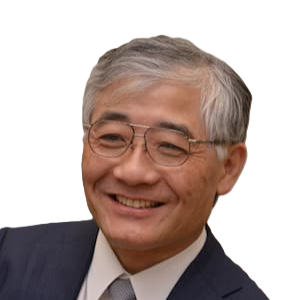Speakers
‹ Back
Prof. Toshio Koike
Executive Director, International Centre for Water Hazard and Risk Management, Public Works Research Institute
CV
Toshio Koike is Executive Director of International Centre for Water Hazard and Risk Management (ICHARM) under the auspices of UNESCO, Public Works Research Institute and Professor Emeritus of the University of Tokyo.
He received the Bachelor, Master, and Doctor of Engineering, from the University of Tokyo, in 1980, 1982, and 1985, respectively. He was a research associate at the University of Tokyo in 1985 and a lecturer from 1986 to 1987, and an associate professor at the Nagaoka University of Technology, Japan from 1988 to 1999 and a professor in 1999. In 1999, he joined the Department of Civil Engineering, the University of Tokyo, where he held the position of Professor until 2017.
His research interests include the water cycle and climate sciences and their applications to water-related disaster reduction, which can be classified into the following three components, the establishment of microwave remote sensing of hydrology, the development of the data integration and information fusion system, and the development of the hydrological downscaling methods including satellite-based data assimilation. Aside from his scientific contributions, he has been leading the international water cycle science projects and the inter-governmental science and technology cooperation. Since 2015, he has chaired the River Council of Japan and led discussions on water-related disasters to advise the Minister of Land, Infrastructure, Transport and Tourism of Japan (MLIT). As a Council Member of the Science Council of Japan, Cabinet Office from 2017 to 2023, he has also contributed to the improvement and development of various aspects of science in disasters by making policy recommendations at the national and international levels.
Some of the prominent awards he has received include the following: “Award for Contribution to the IPCC NOBEL Peace Prize” from WMO and UNEP in 2008, “Science Award” from the Japan Society of Hydrology and Water Resources in 2015, “Friendship Award” from the Government of China in 2019, “AGU Ambassador Award” from the American Geophysical Union in 2022, and “GEWEX (Global Energy and Water Exchanges) Lifetime Contributions Award” from GEWEX in 2024.
Attachment
Abstract
Abstract:Water-related disasters, such as floods and droughts, have been occurring more frequently and with unprecedented severity and extent in many parts of the world due to climate change. As a result, complex, cascading, and systemic risks that usually lurk within social, economic, and environmental systems have suddenly emerged, threatening humanity across boundaries in space and time.
Many stakeholders are involved in improving water resilience. However, they tend to focus on managing each risk separately within their own mandates, and rarely work together to reduce water-related disaster risks synergistically. This siloed approach makes it much harder to seize key opportunities to reduce these risks, especially as there are still regional and local uncertainties in understanding and predicting climate change.
To improve this situation, the science community needs to quantify the uncertainties and integrate the knowledge gained about the water cycle, climate, agriculture, and energy through well-organized observations, modeling, and data and information systems. The science community also needs to foster "facilitators" who can act as catalysts capable of providing expert advice based on a broad range of scientific and indigenous knowledge about climate change in the local context.
In order to share science-based integrated knowledge and adequate capacity for informed cross-sectoral decision-making among all stakeholders, it is essential to formulate platforms at local, national, and regional levels as cross-sectoral governance bodies. In the platform, all stakeholders communicate thoroughly and regularly, take a holistic view of related data and information, as well as other practices and issues, envision ideal futures, and design actions to be taken in a comprehensive manner. The platform can facilitate the linking of cutting-edge science across disciplines with cross-sectoral decision-making and action using an "end-to-end approach."